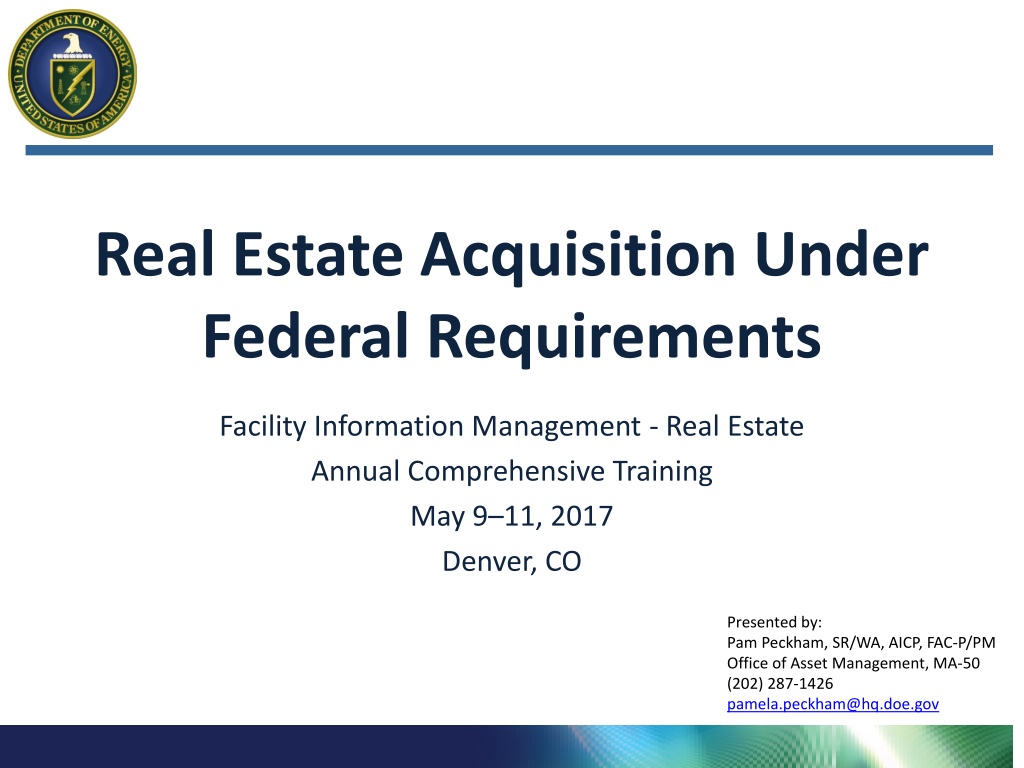
Federal Requirements for Real Estate Acquisition: URA and Agency Responsibilities
Understand the federal requirements for real estate acquisition under the Uniform Relocation Act (URA). Learn about URA objectives, agency responsibilities, appraisal guidelines, and compliance standards. Get insights into ensuring fair treatment, providing relocation assistance, and efficient property acquisition processes.
Download Presentation

Please find below an Image/Link to download the presentation.
The content on the website is provided AS IS for your information and personal use only. It may not be sold, licensed, or shared on other websites without obtaining consent from the author. Download presentation by click this link. If you encounter any issues during the download, it is possible that the publisher has removed the file from their server.
E N D
Presentation Transcript
Real Estate Acquisition Under Federal Requirements Facility Information Management - Real Estate Annual Comprehensive Training May 9 11, 2017 Denver, CO Presented by: Pam Peckham, SR/WA, AICP, FAC-P/PM Office of Asset Management, MA-50 (202) 287-1426 pamela.peckham@hq.doe.gov
The Law and Regulation The Uniform Relocation Act (URA), passed by Congress in 1970, is a federal law that establishes minimum standards for federally funded programs and projects that require the acquisition of real property (real estate) or displace persons from their homes, businesses, or farms. 49 CFR Part 24 is the government-wide regulation that implements the URA. 2
URA Objectives To provide uniform, fair and equitable treatment of persons whose real property is acquired or who are displaced in connection with federally funded projects To ensure relocation assistance is provided to displaced persons to lessen the emotional and financial impact of displacement To ensure that no individual or family is displaced unless decent, safe, and sanitary (DSS) housing is available within the displaced person's financial means To help improve the housing conditions of displaced persons living in substandard housing To encourage and expedite acquisition by agreement and without coercion 3
Agency Responsibilities Appraise property before negotiations Invite the property owner to accompany the appraiser during the property inspection Provide the owner with a written offer of just compensation and a summary of what is being acquired Pay for property before possession Reimburse expenses resulting from the transfer of title such as recording fees, prepaid real estate taxes, or other expenses. 4
Appraisals When is an appraisal needed? Acquisition Disposition Exchanges Leases Easements EULs, licenses, use permits, special programs, agency- specific requirements. Source: GSA 5
Appraisals Government appraisals are required to conform to the Uniform Standards of Professional Appraisal Practice (USPAP) and are required to conform to the Uniform Appraisal Standards for Federal Land Acquisition (UASFLA or Yellow Book ). In addition, land acquisition appraisals are required to comply with the URA implementing regulations - 49 CFR Part 24 Note: UASFLA (Yellow Book) revised in 2016 6
Appraisals When is an appraisal for land acquisition not necessary? The owner is donating the property and releases the Agency from its obligation to appraise the property; or The Agency determines that an appraisal is unnecessary because the valuation problem is uncomplicated and the anticipated value of the proposed acquisition is estimated at $10,000 or less, and a waiver valuation is completed. 7
Appraisal Review Why do I need an appraisal review? Most federal agencies require appraisals to be reviewed by a qualified government review appraiser prior to acceptance. The URA and implementing regulations require a review appraisal for the acquisition of any federally-funded real estate interest. 8
Appraisal Review Who should do an appraisal review? USACOE Review Appraisers GSA Review Appraisers Contract Review Appraisers licensed in the state where the property is located (State DOTs may have a list of qualified review appraisers) 9
Appraisal Review What will the Review Appraiser do? The Review Appraiser will comment on the appraisal s completeness, accuracy, adequacy, relevance and reasonableness so you and your agency will have a better understanding of the reliability of the appraisal s value conclusion. The Review Appraiser makes sure the appraisal conforms with USPAP, the Yellow Book and 49 CFR Part 24 (for acquisition appraisals). 10
Appraisal Results When you get the appraisal---READ IT . But read the review first! The Review Appraisal will: Summarize the main points of the appraisal Help you better understand the appraisal Give you an indication of the quality and reliability of the appraisal. (And help you do your job better!) 11
Establish Just Compensation What is "just compensation ? Just compensation is derived from the appraisal process. Typically, the approved appraisal's estimate of fair market value is the basis for the amount of just compensation offered for the property to be acquired. Just compensation cannot be less than the approved appraisal's estimate of fair market value of the property being. 12
Offer to the Property Owner Provide owner with written offer and summary statement for property to be acquired that is approved by an agency official. Negotiate with owner for the purchase of property at the amount of just compensation (understanding the appraisal will help with the negotiations). 13
Offer to the Property Owner If negotiations are successful, complete the sale and reimburse property owner for related incidental expenses. If negotiations are unsuccessful, consider an administrative settlement to complete the sale 14
Administrative Settlement What is an administrative settlement? When negotiations result in a purchase price exceeding the agency's estimate of just compensation, it is called an administrative settlement. Administrative settlements are made for administrative reasons that are considered to be in the best interest of the public. 15
Administrative Settlement Authorized agency officials may approve administrative settlements if they are: Reasonable Prudent, and In the public interest Agency files should include proper documentation to justify and support the decision for an administrative settlement. 16
Condemnation If negotiations are still unsuccessful, the agency should acquire the property through use of eminent domain 17
QUESTIONS 18
